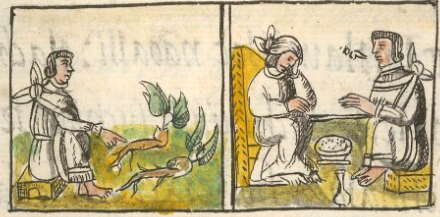cimatl (FCbk10f20r)
This iconographic example, featuring an edible root that also has a medicinal value (cimatl, sometimes spelled cimatli), is included in this digital collection for the purpose of making comparisons with related hieroglyphs. The term selected for this example comes from comparing the image from the Digital Florentine Codex with a term in the Online Nahuatl Dictionary. There is no keyword, gloss, or any relevant terminology in the text on the same folio as the image. Thus, the level of certainty behind the title for this example is less than 100%. The example shows two plants with green leaves and large, brown, tuberous roots. While these plant materials might not be cimatl, they are shown in the context of discussing physicians and their remedies. A man’s finger points to the roots. He may be a healer. Pointing suggests some authority on his part; it may also intend to direct our attention more to the root than the leaves.
Stephanie Wood
The most commonly named root that is both a food starch and a medicinal so far in this collection is the cimatl. Like the example of the plant in this record, the glyphs typically show some leaves with the roots. Cima, an apocopated version of the plant name, was a popular personal name. A few of the many Cima glyphs in this collection appear below.
Stephanie Wood
1577
Jeff Haskett-Wood
plantas comestibles, pahtli, patli, médico, médicos
cima(tl), a food and medicinal plant with large roots, https://nahuatl.wired-humanities.org/content/cimatl
una planta alimenticia con propiedades medicinales
Stephanie Wood
Available at Digital Florentine Codex/Códice Florentino Digital, edited by Kim N. Richter and Alicia Maria Houtrouw, "Book 10: The People", fol. 20r, Getty Research Institute, 2023. https://florentinecodex.getty.edu/en/book/10/folio/20r/images/0 Accessed 5 September 2025.
Images of the digitized Florentine Codex are made available under the following Creative Commons license: CC BY-NC-ND (Attribution-NonCommercial-NoDerivs 4.0 International). For print-publication quality photos, please contact the Biblioteca Medicea Laurenziana ([email protected]). The Library of Congress has also published this manuscript, using the images of the World Digital Library copy. “The Library of Congress is unaware of any copyright or other restrictions in the World Digital Library Collection. Absent any such restrictions, these materials are free to use and reuse.”





